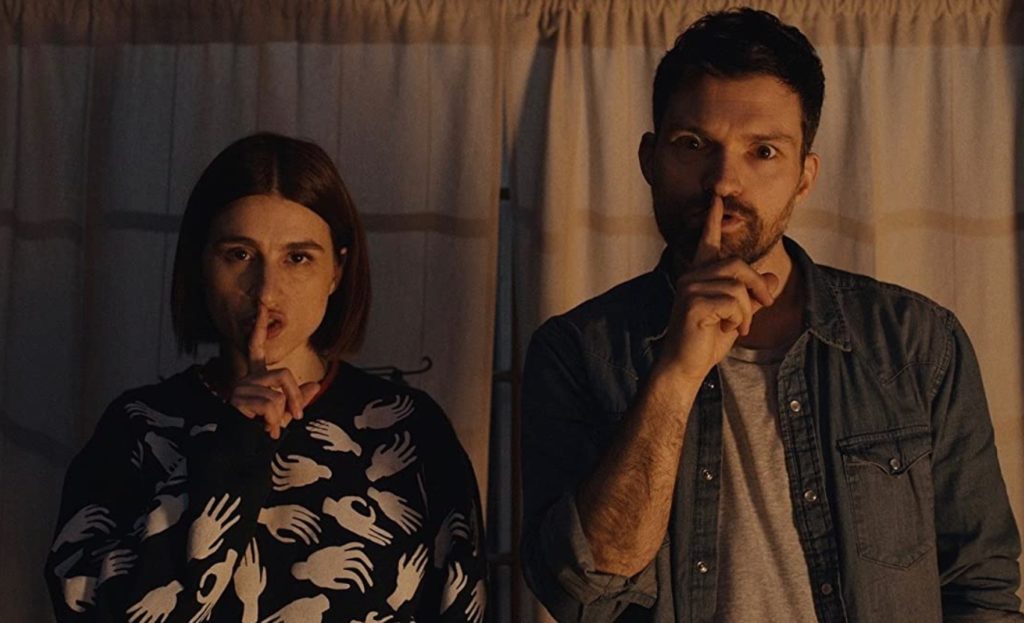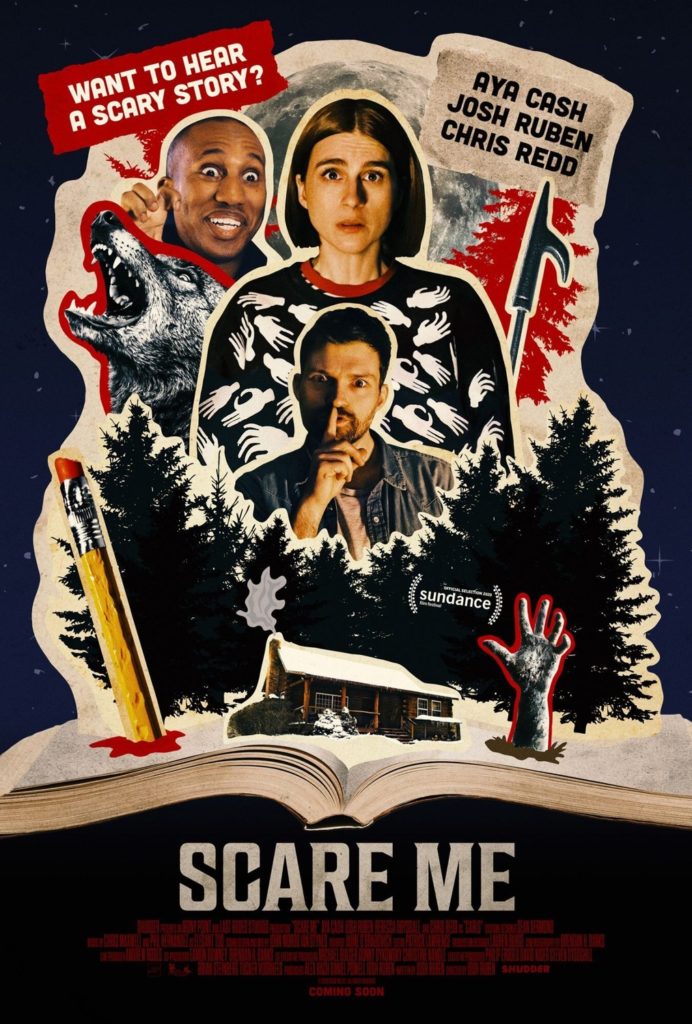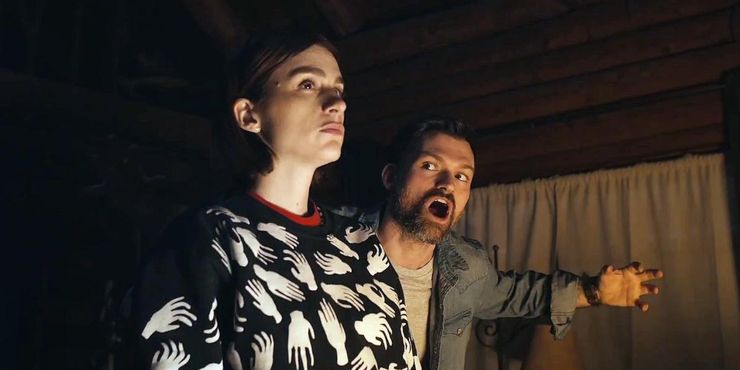
The year 1816 is often recalled as Eighteen Hundred and Froze to Death. Fallout from the eruption of the Tambora Volcano in Indonesia a year earlier led to freezing temperatures and disastrous weather patterns. In June of this “year without summer”, heavy rains near Lake Geneva drove a small group of vacationers to seek refuge within Villa Diodati. Comprising this group was Lord Byron, renter of the villa, as well as John Polidori, his personal physician, and a couple on holiday who were staying nearby – Percy Shelley and his future wife, Mary Godwin. Stuck inside, they whiled away their time reading spooky stories…until Percy came up with a capital idea. The resulting competition to produce the best ghost story, of course, is stuff of horror legend. Young Mary Godwin penned the first draft of Frankenstein, effectively inventing science fiction, and John Polidori wrote The Vampyre, consolidating vampire lore into the modern romantic vampire genre. Writer, director and star Josh Ruben channels that same creative glee and celebration of terror in his film Scare Me.
Fred Banks is a writer. Well, to be more exact, he’s a copywriter looking to perform a mid-career pivot to long form prose. He postures as a novelist, though. After all, he just flew clear across the country, from LA to the Catskills, to retreat to a remote cabin and write the next great American horror novel. The trouble is, all he’s got is a derivative idea for a werewolf revenge story and a crippling case of writer’s block. The next morning, whilst on a run, hoping get the creative juices flowing, Fred encounters another jogger. To his delight, he finds that not only is she staying at a cabin in the same snowy enclave as he, but she is also a horror novelist! His newly met neighbor, Fanny, has published Venus, a bestselling smash hit. Fred is at first excited to have met a fellow writer, but falters when she asks if he’s written anything she may have read. He chokes out that he “had a few things in development”, and Fanny immediately surmises aloud that “yours is a no.” Fanny, like the viewer, quickly gathers that he is simply playing author, and shows no compunction reminding him of that, or quickly extracting herself from the conversation. And why should she? He’s just a weird wannabe that she ran into on a lonely country road. However, when the weather takes a turn that evening, and the driving snow knocks out the power, Fanny calls on this rookie writer with a simple request: “scare me”. And, like an echo of 1816, the duo launch into an epic night of duelling campfire tales. Only, unlike their spiritual predecessors, these two are unknown quantities, and what’s scarier than being snowed in and isolated with a complete stranger?

While lingering doubts about the wisdom of sequestering with a stranger drive the framing narrative and inject the film with a nagging sense of tension, Scare Me isn’t very scary. In fact, it is in large part a comedic dive into our love for, and the creation of, scary stories. The set-up is straightforward; Fred and Fanny are stuck in his cabin, and we watch as the narratives they share unfold right there. As they work, the creators stumble, interrupt, get distracted, and lose their train of thought. Most of the stories the colleagues share are not particularly spooky to begin with, and even with the scarier ones, they invariably lose momentum and tension when one of the writers interrupts to offer notes or a ‘yes and’. As counterbalance to the editorial interruptions, Ruben also recognizes a tale well told: as a story catches fire, elements are emphasized with sound effects. Just as the atmosphere from a good horror yarn can spread beyond the television, so too do we watch as particularly powerful bits of stories are made manifest in Fred’s cabin. As terror builds, low growls issue from the darkness, gunshots echo out, or wheels squeak slowly across the wooden floors overhead. So while Scare Me trades-in much of the dread associated with horror stories, it is a pleasure to watch them play out in real time.
As our battling storytellers, Josh Ruben and Aya Cash are both fantastic, and they deliver their narratives with verve. Ruben’s Fred commits wholeheartedly to his characters, hissing, growling and shrieking, all the while contorting his face in exaggerated masks of emotion. His full-body pantomime imbues his characters with life – and a humor that reflects the joy of storytelling. Fanny is the perfect foil to Fred; she is a better storyteller and an exacting editor. Her stories are more thought out, and Cash’s own sound effects and timing bring the scares to heights Fred just can’t reach. Furthermore, Cash brings her biting wit to a torrent of constructive criticism wrapped in a solid streak of snark. In provoking Fred she is harsh – but never mean – and hurls her heckles with spot-on timing. Best of all, Fanny’s criticisms bring to the film a self-awareness that acknowledges horror tropes but still appreciates a spooky yarn. Here, the writing leans right up against the fourth wall: Fanny could just as easily be sitting on our couch as she sits on Fred’s. The outcome is a clever, at times zany, metanarrative investigation of what makes a good scary story.
Through all this fun, however, it is easy to forget that Scare Me still purports to be a horror film. On one level, it is: the inherent tension in the relationship between protagonists, and the circumstances that brought them together, lurks just off screen. Fred is creeping into middle age, frustrated by an unexceptional career, and it clearly rankles that Fanny is an accomplished writer and a successful, confident young woman.
This dynamic rears up between stories and colors the peers’ interjections just enough to leave a persistent concern. Power, in its various incarnations, shifts fluidly between the characters over the course of the evening and culminates in an intelligent third act. Unfortunately, balancing the tension of the framing narrative with the sheer joy of storytelling proves to be a rather difficult task, and is one point where Scare Me struggles. Even though Ruben’s script does good accounting and his finale cleverly integrates the themes of Scare Me, it still feels tonally mismatched with the jubilant heights of its leads’ jointly improvised tales. The exuberance of the authors’ storytelling just eclipses everything else. That’s not necessarily a bad thing, though. In spite of its uneven tone, Scare Me is a smartly crafted film that wholeheartedly embraces the art of storytelling. And although the stories from this Catskills cabin might not rival those born of Villa Diodati, it’s a rare pleasure to glimpse the creative process along with the final product.
